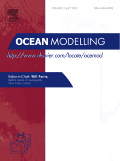
OCEAN MODELLING
Scope & Guideline
Charting New Territories in Marine Modeling.
Introduction
Aims and Scopes
- Numerical Ocean Modelling:
The core focus of the journal is on the development and application of numerical models to simulate oceanic processes. This includes the modeling of ocean currents, waves, tides, and interactions with the atmosphere. - Biogeochemical Processes:
Research on the interplay between physical ocean dynamics and biogeochemical cycles is a significant aspect. This includes studies on nutrient cycling, carbon fluxes, and the impacts of ocean chemistry on marine ecosystems. - Climate Change Impacts:
The journal frequently publishes studies examining the effects of climate change on ocean systems, including sea level rise, ocean warming, and changes in ocean circulation patterns. - Data Assimilation Techniques:
A strong emphasis is placed on data assimilation methods that integrate observational data into ocean models to improve predictive capabilities and model validation. - Machine Learning Applications:
Emerging methodologies involving machine learning and artificial intelligence are increasingly featured, showcasing their application in enhancing model accuracy and forecasting capabilities. - Coastal and Estuarine Dynamics:
Research focusing on coastal and estuarine environments, including storm surge modeling, sediment transport, and coastal ecosystem interactions, is prominently represented. - Interdisciplinary Approaches:
The journal encourages interdisciplinary research that combines oceanography with atmospheric sciences, hydrology, and environmental science to address complex oceanic challenges.
Trending and Emerging
- Advanced Machine Learning Techniques:
The use of machine learning and artificial intelligence in ocean modeling is rapidly increasing. This includes applications for predicting ocean dynamics, optimizing model parameters, and assimilating observational data. - Multi-Scale Modeling Approaches:
There is a trend towards multi-scale modeling, which integrates various spatial and temporal scales to provide a more comprehensive understanding of ocean dynamics and their interactions with climate systems. - Impact of Marine Heatwaves:
Research focusing on marine heatwaves and their ecological and biogeochemical impacts is gaining prominence, reflecting the growing concern over climate change effects on marine environments. - Coupled Ocean-Atmosphere Models:
Studies integrating ocean and atmosphere modeling are on the rise, emphasizing the importance of understanding coupled systems in predicting weather patterns and climate variability. - Coastal Resilience and Adaptation Strategies:
Increasingly, papers are addressing coastal resilience and adaptation strategies in response to climate change, highlighting the need for sustainable management of coastal resources. - Ocean Data Assimilation Innovations:
Innovations in data assimilation techniques are trending, with a focus on improving model accuracy and predictive capabilities through the integration of diverse data sources, including satellite observations.
Declining or Waning
- Traditional Hydrostatic Models:
There appears to be a decline in the publication of studies solely relying on traditional hydrostatic models, as newer, more sophisticated modeling techniques that capture non-hydrostatic effects gain traction. - Basic Wave Theory Applications:
Research focused on basic wave theory without integration into more complex models or real-world applications is less frequently represented, indicating a shift towards more applied and interdisciplinary studies. - Static Parameterizations:
Static parameterization methods in ocean models are being phased out in favor of dynamic and adaptive approaches that better account for variability in ocean conditions. - Standalone Empirical Models:
There is a noticeable reduction in standalone empirical models that do not incorporate physical principles or data assimilation, as the community increasingly values integrated and data-driven approaches.
Similar Journals
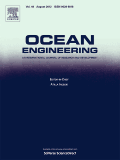
Ocean Engineering
Unraveling the Mysteries of Ocean DynamicsOcean Engineering, published by PERGAMON-ELSEVIER SCIENCE LTD, is a prestigious peer-reviewed journal that has been at the forefront of marine sciences since its inception in 1968. With an impressive impact factor and recognition in the Q1 quartile of both Environmental Engineering and Ocean Engineering, it stands as a key resource for researchers, professionals, and students alike. This journal focuses on a wide range of topics relevant to the field, including coastal engineering, marine resource management, and ocean dynamics, aiming to bridge theoretical research and practical applications. As ranked 14th in Ocean Engineering according to Scopus, it reflects the influential contributions of its articles and provides a platform for innovative discoveries that advance the field. Although not open-access, it offers diverse subscription options for accessing cutting-edge research. The journal’s ongoing legacy of publishing high-quality research continues to contribute significantly to the advancement of knowledge in ocean-related engineering disciplines.

JOURNAL OF WATERWAY PORT COASTAL AND OCEAN ENGINEERING
Navigating Innovations in Waterway EngineeringThe JOURNAL OF WATERWAY PORT COASTAL AND OCEAN ENGINEERING, published by the ASCE - American Society of Civil Engineers, is a premier scholarly journal devoted to the interdisciplinary fields of waterway, port, coastal, and ocean engineering. Since its inception in 1982, the journal has provided a crucial platform for researchers, professionals, and students to share innovative findings and advancements related to the engineering and management of aquatic environments. With an impressive Q2 ranking in multiple categories, including Civil and Structural Engineering, Ocean Engineering, and Water Science and Technology, the journal is recognized for its significant contributions to the field. It seeks to publish high-quality research that addresses both theoretical and practical challenges while promoting sustainable practices in marine and coastal systems. Holding a prominent Scopus rank and providing access to a global readership, the journal stands as an invaluable resource for those dedicated to advancing the science and engineering of water environments.
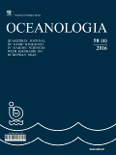
OCEANOLOGIA
Transforming Ocean Knowledge into ActionOCEANOLOGIA, a distinguished academic journal published by the Polish Academy of Sciences, Institute of Oceanology, serves as a pivotal platform for researchers and professionals in the fields of Aquatic Science, Oceanography, and Ocean Engineering. Established in 1973 and transitioning to Open Access in 2011, this peer-reviewed journal promotes the dissemination of high-quality research across its diverse scope of ocean-related topics, aligning with its commitment to advancing marine science. With a notable impact factor underscored by its positioning in the Q1 and Q2 quartiles of recognized categories, OCEANOLOGIA stands out with impressive Scopus Rankings, including 49/247 in Aquatic Science and 24/105 in Ocean Engineering, reflecting its significance in the global research landscape. The journal's dedication to publishing cutting-edge studies ensures that it continues to influence both academic discourse and practical applications in ocean-related fields, making it an essential resource for students, researchers, and professionals aiming to contribute to the advancement of oceanic studies.
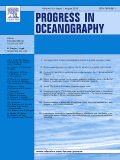
PROGRESS IN OCEANOGRAPHY
Pioneering Research in Aquatic SciencesPROGRESS IN OCEANOGRAPHY is a pivotal journal published by PERGAMON-ELSEVIER SCIENCE LTD, dedicated to advancing the field of oceanographic research and exploration. With an ISSN of 0079-6611 and an E-ISSN of 1873-4472, this esteemed publication has been disseminating significant findings from 1963 and continues to be a cornerstone in aquatic sciences and geology, holding a distinguished Q1 ranking in both categories as of 2023. The journal primarily focuses on innovative research that contributes to our understanding of ocean processes, marine ecosystems, and the impact of human activities on the oceans. Its exclusive access model facilitates the dissemination of high-quality content that resonates with researchers, professionals, and students alike, ensuring that vital insights are accessible to the global scientific community. With a firm commitment to upholding rigorous scientific standards, PROGRESS IN OCEANOGRAPHY remains an influential platform for the communication of groundbreaking research, providing scholars with invaluable resources to drive future oceanographic studies.

TELLUS SERIES A-DYNAMIC METEOROLOGY AND OCEANOGRAPHY
Empowering Scholars with Open Access ResearchTELLUS SERIES A-DYNAMIC METEOROLOGY AND OCEANOGRAPHY, published by Stockholm University Press, is a prestigious open-access journal that has been at the forefront of research in the fields of atmospheric science and oceanography since its inception in 1983. With an enduring commitment to disseminating high-quality, peer-reviewed research, the journal has achieved a commendable impact factor, securing its position in the Q2 category for both Atmospheric Science and Oceanography as of 2023. The journal's significant reach is reflected in its Scopus rankings, being positioned at Rank #51 in Oceanography and Rank #77 in Atmospheric Science. With open access established since 2012, TELLUS SERIES A serves not only as a vital resource for researchers and professionals in these dynamic fields but also as an inclusive platform for budding scholars and students. Engaging with this journal allows readers to stay updated on the latest developments and groundbreaking discoveries that advance our understanding of climate systems and marine environments. Its editorial ethos emphasizes the cross-disciplinary integration of atmospheric and oceanographic studies, making it an essential publication for anyone invested in environmental research and policy.

Ocean Science Journal
Pioneering Research for Our Blue PlanetOcean Science Journal, published by the Korea Institute of Ocean Science and Technology (KIOST), is a pivotal resource for scholars and practitioners in the field of oceanography. With the ISSN 1738-5261 and E-ISSN 2005-7172, this journal presents cutting-edge research from 2006 to 2024, bridging fundamental and applied ocean sciences. Based in South Korea, with its headquarters located in Busan, the journal has achieved a commendable Scopus rank of #72 out of 145 in the domain of Earth and Planetary Sciences, placing it in the 50th percentile among peer publications. Classified in the Q3 category of the 2023 Oceanography rankings, Ocean Science Journal offers a platform for innovative studies that advance understanding of marine environments and promote sustainable ocean practices. While it does not operate under an open access model, readers and contributors can expect high-quality, peer-reviewed material that addresses pressing oceanic challenges and developments. This journal serves as an essential tool for researchers, professionals, and students committed to fostering marine science and ocean technology.
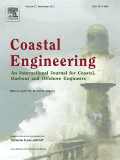
COASTAL ENGINEERING
Driving Excellence in Environmental and Ocean EngineeringCOASTAL ENGINEERING is a prestigious journal published by Elsevier, focusing on the multidisciplinary fields of coastal and ocean engineering. With its ISSN 0378-3839 and E-ISSN 1872-7379, this journal has established a reputation for contributing high-quality research that addresses the dynamic challenges faced in coastal environments. Notably, it holds a remarkable Q1 ranking in both Environmental Engineering and Ocean Engineering categories, placing it in the top tier of academic journals with an impressive Scopus rank of #6 among 105 in Ocean Engineering and #28 among 197 in Environmental Science. The journal spans from its inception in 1973 to the present, with valuable insights that shape future developments in coastal management, sustainability, and engineering practices. Although it does not currently offer an Open Access option, its impact on advancing knowledge in the field is significant, making COASTAL ENGINEERING an essential resource for researchers, professionals, and students devoted to the preservation and enhancement of coastal and marine environments.

Journal of Ocean University of China
Connecting Scholars to Shape the Future of the SeasThe Journal of Ocean University of China, ISSN 1672-5182, is a premier academic journal dedicated to advancing the fields of Ocean Engineering and Oceanography. Published by the esteemed Ocean University of China, the journal serves as a vital platform for researchers, professionals, and students to disseminate groundbreaking findings and foster collaboration in marine science and engineering. With a commitment to quality, the journal currently holds a Q3 ranking in both Ocean Engineering and Oceanography as of 2023, indicating its significant contributions within the scientific community. The journal's scope encompasses a wide range of topics including marine technology, ecological studies, and coastal management, all aimed at enhancing the understanding and utilization of oceanic resources. Although currently not Open Access, it continues to attract submissions from renowned scholars, ensuring a diverse and innovative range of research. By providing access to cutting-edge research and practical insights, the Journal of Ocean University of China plays a critical role in shaping the future of ocean sciences and engineering.
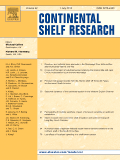
CONTINENTAL SHELF RESEARCH
Pioneering Research at the Edge of the SeaCONTINENTAL SHELF RESEARCH, published by PERGAMON-ELSEVIER SCIENCE LTD, is an esteemed journal within the fields of Aquatic Science, Geology, and Oceanography, reflecting a compelling intersection of these disciplines. Since its inception in 1982, this journal has served as a premier platform for disseminating cutting-edge research relevant to the continental shelf ecosystem, including its geological features, biological resources, and physical processes. With a Category Quartile ranking of Q1 in Aquatic Science and prominent Q2 standings in Geology and Oceanography, it is recognized for its rigorous peer-review standards and impactful contributions, evidenced by its respective rankings in Scopus. Researchers and professionals are encouraged to engage with the journal's array of high-quality articles that not only enhance scientific understanding but also inform policy and conservation efforts. This dedication to advancing knowledge makes CONTINENTAL SHELF RESEARCH an essential resource for those passionate about marine and coastal studies in the United Kingdom and globally.
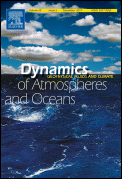
DYNAMICS OF ATMOSPHERES AND OCEANS
Fostering Innovation in Atmospheric and Oceanic SciencesDYNAMICS OF ATMOSPHERES AND OCEANS, published by Elsevier, is a renowned journal that has established itself as a vital resource in the fields of atmospheric science, oceanography, and geology. With a rich publication history stretching from 1976 to 2024, this journal provides a platform for high-quality research that addresses the complex interactions between the atmosphere and oceans, which are critical to understanding climate change and environmental systems. It enjoys a respectable impact factor and a reputable position within its category quartiles, specifically noted as Q2 in critical domains such as Computers in Earth Sciences and Oceanography. Researchers and professionals benefit from its indexed coverage, featuring a Scopus ranking that places it among the leading journals in its categories. Although it is not an open-access journal, readers can access its cutting-edge articles through institutional subscriptions or individual purchases. The journal aims to foster cross-disciplinary dialogue and innovation by publishing original research, reviews, and insightful commentary, making it a cornerstone for scholars, students, and practitioners committed to advancing knowledge in the dynamic interplay of Earth's atmospheric and oceanic systems.